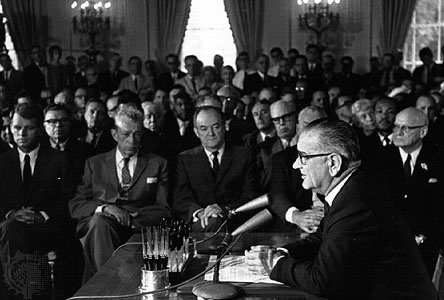Civil Rights Act
United States 【1964】
(1964), comprehensive U.S. legislation intended to end discrimination based on race, colour, religion, or national origin; it is often called the most important U.S. law on civil rights since Reconstruction (1865–77). Title I of the act guarantees equal voting rights by removing registration requirements and procedures biased against minorities and the underprivileged. Title II prohibits segregation or discrimination in places of public accommodation involved in interstate commerce. Title VII bans discrimination by trade unions, schools, or employers involved in interstate commerce or doing business with the federal government. The latter section also applies to discrimination on the basis of sex and established a government agency, the Equal Employment Opportunity Commission (EEOC), to enforce these provisions. The act also calls for the desegregation of public schools (Title IV), broadens the duties of the Civil Rights Commission (Title V), and assures nondiscrimination in the distribution of funds under federally assisted programs (Title VI).
 The Civil Rights Act was a highly controversial issue in the United States as soon as it was proposed by President John F. Kennedy (Kennedy, John F.) in 1963. Although Kennedy was unable to secure passage of the bill in Congress, a stronger version was eventually passed with the urging of his successor, President Lyndon B. Johnson (Johnson, Lyndon B.), who signed the bill into law on July 2, 1964, following one of the longest debates in Senate history. White groups opposed to integration with blacks responded to the act with a significant backlash that took the form of protests, increased support for pro-segregation candidates for public office, and some racial violence. The constitutionality of the act was immediately challenged and was upheld by the Supreme Court in the test case Heart of Atlanta Motel v. U.S. (1964). The act gave federal law enforcement agencies the power to prevent racial discrimination in employment, voting, and the use of public facilities.
The Civil Rights Act was a highly controversial issue in the United States as soon as it was proposed by President John F. Kennedy (Kennedy, John F.) in 1963. Although Kennedy was unable to secure passage of the bill in Congress, a stronger version was eventually passed with the urging of his successor, President Lyndon B. Johnson (Johnson, Lyndon B.), who signed the bill into law on July 2, 1964, following one of the longest debates in Senate history. White groups opposed to integration with blacks responded to the act with a significant backlash that took the form of protests, increased support for pro-segregation candidates for public office, and some racial violence. The constitutionality of the act was immediately challenged and was upheld by the Supreme Court in the test case Heart of Atlanta Motel v. U.S. (1964). The act gave federal law enforcement agencies the power to prevent racial discrimination in employment, voting, and the use of public facilities.- ebony
- E B Pusey
- Ebro River
- Ebroïn
- ebullism
- Eburon glacial stage
- E.B. White
- Ecbatana
- E C Bentley
- Eccard, Johannes
- Ecce Homo
- eccentric-and-rod mechanism
- Ecclesia
- Ecclesiastes
- ecclesiastical court
- ecclesiastical heraldry
- Ecclesiasticus
- ecclesiolae in ecclesia
- Eccles, Sir John Carew
- Eccles, William Henry
- eccyclema
- Ecevit, Bülent
- Ecgfrith
- Ech- Cheliff
- Echegaray y Eizaguirre, José